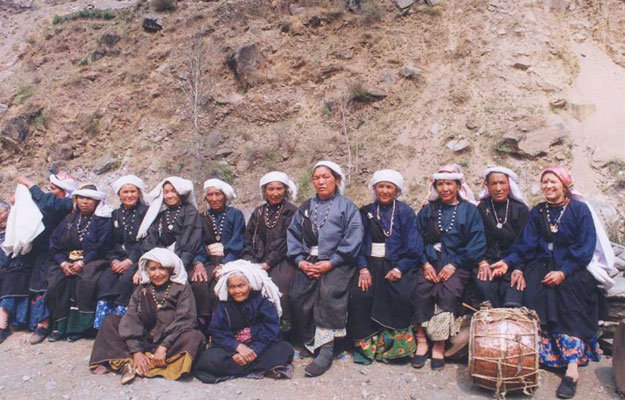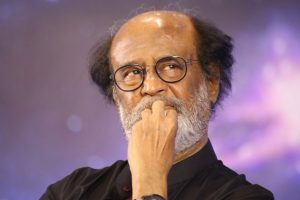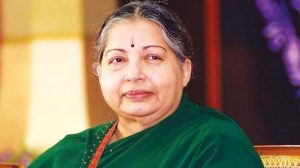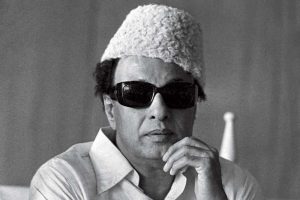Politics
45th Anniversary of Chipko Celebrated With A Google Doodle

Google celebrated the 45th anniversary of the Chipko Movement today with a Doodle that evokes the spirit of the laudable ecofeminist movement
Text credit: Rheanna Mathews
When one hears the word, ‘Chipko’, images spring to mind of women and children forming protective rings around trees, saving them from loggers with saws and other terrifying machinery. A largely 70s movement that followed Gandhian principles of satyragraha, and one of the first where women played pivotal roles, it was an ecological spark that spread across northern India, with far reaching effects the world over.

Source: savageonline.co.uk
The Chipko Movement was ecofeminism at its finest, with women the lynchpins that held the movement together. This was unsurprising, since they were most affected by the lack of firewood, fodder and water, and the loss of livelihood. Since logging contractors were the main source of liquor for the men of these communities, larger social issues also came to be included in the movement.

Source: wagingnonviolence.org
Though it is the 45th anniversary of the modern Chipko Movement that began in modern day Uttarakhand, with Chandi Prasad Bhatt and Sundarlal Bahuguna the names associated with it, Chipko has it roots in eighteenth century Rajasthan, where hundreds of people from the Bishnoi community protested the logging of the khejri trees with their lives. Where the Bishnois were successful by getting a royal decree banning the cutting of trees in their villages, the modern day Chipko Movement, which gained traction under Sundarlal Bahuguna, saw in 1980, the Indira Gandhi government issue a fifteen year ban on the felling trees in the Himalayas, until the denuded forests were restored.

Source: Wikipedia
The Chipko Movement was a non-violent uprising that successfully mitigated the rampant deforestation to feed the globalised commercial machine. The agitation by villagers and forest communities which saw that the ecological balance was maintained, is a laudable legacy for India’s civil society today.
For more on Google Doodles, go here.
In Focus
Raise Your Glass and Unleash the Party: Haryana’s Corporate Offices Embrace Boozy Bliss with New Liquor Policy!

Haryana, a state known for its rich culture and rapid economic growth, has recently introduced a new liquor policy that has created a buzz in the corporate world. The new policy allows corporate offices in Gurugram and other areas of Haryana to serve low-content alcoholic drinks like wine and beer on their premises. This policy aims to strike a balance between relaxation and responsible consumption within the corporate sector.
The Haryana government’s approval of the 2023-24 excise policy is the driving force behind the new liquor policy, enabling corporate offices to serve alcohol with certain restrictions. The policy mandates that offices must establish a canteen or eatery with an area of not less than 2,000 square feet to serve low-content alcoholic beverages. This regulation ensures that offices provide suitable spaces for employees to unwind during breaks or social events.
The introduction of this new policy is a breath of fresh air for corporate offices that were once limited to offering only non-alcoholic beverages. The move is in line with changing workplace dynamics and the growing need for employees to enjoy a balanced work-life culture. Corporate offices in Haryana can now cultivate a more relaxed and social atmosphere, potentially fostering creativity, camaraderie, and improved employee well-being.
The Haryana government has also introduced the retail permit fee to generate revenue for environmental conservation and animal welfare initiatives. The policy aims to collect an estimated Rs 400 crore for the Environment and Animal Welfare – Gau Seva fund. The nominal increase in excise duty rates on country liquor and Indian Made Foreign Liquor (IMFL) further contributes to the revenue collection.
The introduction of low-content alcohol in corporate offices may also reshape workplace dynamics, promoting a more relaxed and socially engaging environment. By providing designated spaces for the consumption of alcoholic beverages, corporate offices can encourage professionals to unwind, socialize and enjoy responsible alcohol consumption.
Haryana’s new liquor policy allows corporate offices to serve low-content alcohol and enables employees to unwind during breaks or social events. This policy strikes a balance between relaxation and responsibility, enabling professionals to enjoy controlled alcoholic beverages. It is an exciting move that will undoubtedly enhance workplace culture, promote social interaction, and boost employee well-being. The Haryana government’s focus on environmental conservation and animal welfare initiatives is commendable and demonstrates its commitment to responsible business practices. Corporate offices in Haryana must embrace this new policy as an opportunity to cultivate a more relaxed and socially engaging workplace culture.
People
Mystery Solved! It Really Was Kim Jong-un in the Armoured Green Train!

The mystery is finally solved. China has confirmed that it was indeed the North Korean despot, Kim Jong-un, who visited Beijing in the distinctive green train
Text credit: Rheanna Mathews
World media went nuts earlier this week when an armoured train, painted a distinctive green with a prominent yellow stripe, chugged into Beijing’s central railway station.

Source: theguardian.com
Media speculated that perhaps the head of rogue state, North Korea, Kim Jong-un had come to pay Xi Jinping, President of the PRC, a visit. And they were right!

Source: nytimes.com
Just as news agencies speculated, Kim did meet Xi in a meeting kept secret from the world until after it was over. This seems to be another episode of Kim’s newfound diplomacy – nuclear missile tests and threats of World War 3 had been his forte earlier – as he gears up to discuss the denuclearisation of his state with South Korean and US heads of state in April and May respectively. His courteous and diplomatic side came to fore earlier this month when he hosted South Korean diplomats.

Source: nytimes.com
Whatever the reason for North Korea trying their hand at foreign policy that doesn’t antagonise all players, the train seems to be a symbol of sorts. Kim’s father, Kim Jong-il also made foreign visits (and hosted lavish parties according to this article) on these slow-moving armoured trains.
There are reports of there being 90 armoured carriages in total, with three trains that operate in tandem – the first with security personnel that scouts ahead, the second carrying the leader and the third carrying his extended entourage and supplies. It is also said that Kim Sr. used the trains to make inspection visits to army units and had close to 20 railway stations built for his exclusive use.
Entertainment
Indian Celebrities who turned Politicians

From MGR to Rajinikanth, celebrities make their way into politics to create political revolutions.
RAJINIKANTH
Superstar Rajnikant’s entry into politics has made Tamil Nadu go all gaga. The superstar said he wants to create a political revolution by forming his new party

Image source: news18
MGR
One of the most prominent names in Indian political history, Maruthur Gopalan Ramachandran, aka MGR, was a pioneer in shifting gears from the film industry to politics. Though he campaigned for DMK, he later founded his own party, ADMK. He became the Chief Minister of Tamil Nadu in 1977 and continued in office until his death in 1987.
Hema Malini
Actress-politician Hema Malini campaigned for the Bharatiya Janata Party (BJP) candidate Vinod Khanna, former Bollywood actor during the Lok Sabha elections in Gurdaspur, Punjab. From 2003 to 2009, the then President of India APJ Abdul Kalam nominated her as the MP to the Rajya Sabha. She officially joined BJP in 2004 and was appointed as the general secretary of the BJP.

Image source: completewellbeing
J Jayalalitha
Jayaram Jayalalitha was an Indian actress and politician who served as the chief minister of Tamil Nadu for over fourteen years. She is considered as one of the most powerful female figures in India.

Image source: deccanchronicle
Chiranjeevi
The Telugu superstar started his own political party, Praja Rajyam in 2008 and later merged it with the Indian National Congress (INC). He even served as the Union Minister of State, Ministry of Tourism.

Image source: indianexpress
Jaya Bachchan
Actress Jaya Bachchan is one of the most versatile actresses of Indian cinema and has showcased her talent and capability not only as an actress but also as a politician. She has always been quite active when it comes to the political scene. She is also felicitated with India’s fourth highest civilian award Padma Shri by the Government of India.

Image source: starsunfolded
Kirron Kher
Kirron Kher started her political career with her involvement with non-profit organizations such as ‘Laadli’ – campaign against female infanticide and ‘Roko Cancer’ – campaign for Cancer awareness. She has also participated in the Anna Hazare’s Indian anti-corruption movement in 2011. She has always been a vocal admirer of Narendra Modi even before he became the Prime Minister of India and has also campaigned for BJP during the 2011 municipal corporation elections. BJP declared her as the Lok Sabha candidate from Chandigarh for General Elections 2014 and Kirron even won the seat with a good majority.

Image source: starsunfolded
Shabana Azmi
One of the finest actress in Indian cinema, Azmi is also a noted social activist. In 1997, she was nominated as a member of Rajya Sabha.

Image source: indiatoday
Let us know about your thoughts on actors turning into politicians. How far do you think things will change?
-

 Style11 months ago
Style11 months agoBridal Guide : Best Looks of Radhika Merchant Ambani
-

 Fashion1 year ago
Fashion1 year agoMost Discussed Ajrakh Saree of Alia Bhatt
-

 Entertainment1 year ago
Entertainment1 year agoThe Most Stylish Guests of Bhagya Suresh Reception
-

 Entertainment1 year ago
Entertainment1 year agoBridal Bliss : All Bridal Looks of Swasika Vijay
-

 Movies1 year ago
Movies1 year agoA Nostalgic Journey Through Love &Cinema : Best Bollywood Romantic 90s Movies
-

 AD8 months ago
AD8 months agoPopular Curtain Fabrics to Consider for Your Home
-

 Fashion1 year ago
Fashion1 year agoMajor Denim Trends You Need To Know in 2024
-

 Events9 months ago
Events9 months agoBest of Fashion Looks : Diya Krishna Wedding



























